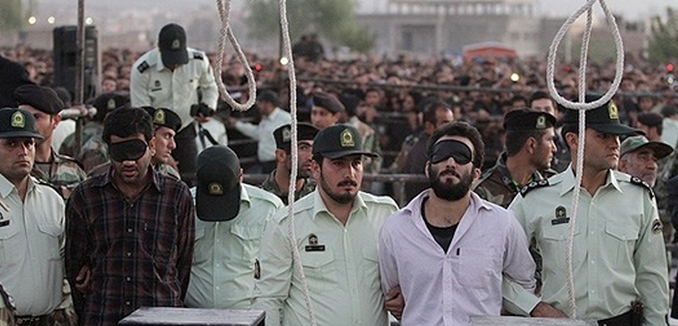United Nations Secretary General Ban Ki-moon blasted Iran for its “alarming rate” of executions and the lack of improvement made under the administration of Iranian President Hassan Rouhani in a report released this week.
Ban is “deeply troubled” by accounts “of executions, floggings, arbitrary arrests and detentions, unfair trials, denial of access to medical care and possible torture and ill-treatment,” according to the 19-page assessment, the last one issued before his term expires.
He also expressed concern “about continued restrictions of public freedoms and the related persecution of civil society actors, the persistence of discrimination against women and minorities and conditions of detention.”
The rate of executions — which last year reached a decade high of 966, according to the UN — is still a matter of concern to the world body, especially because trials “fall short of the international fair standards,” the report added.
Ban’s report also called attention to the case of anti-death penalty activist Narges Mohammadi, who was recently sentenced to 16 years in prison for founding and running a grassroots organization opposed to capital punishment.
The report further highlighted Iran’s persecution of ethnic minority groups including Arabs, Azeris, Baluch, Kurds, and the Baha’i community, which it described as “the most severely persecuted religious minority” and a target of systemic discrimination. “In the Islamic Republic of Iran, access to education at technical and vocational universities and non-governmental educational institutions is restricted according to one’s religion,” the report explained. Last month, 14 members of the faith were arrested in Shiraz. A 19-year-old Baha’i student, Faraz Karin-Kani Sisa, was the latest to be expelled from university on account of his faith. Another man, Kamran Aghdasi-Yekta, had his auto repair shop closed for four years because he is Baha’i.
Discrimination against the Baha’i community is deeply entrenched in Iran, and members of the faith are routinely vilified by public officials. “We will never accept that Baha’is have the right to education. They don’t even have rights as citizens,” Ayatollah Mohammad Mousavi Bojnourdi, a former member of Iran’s Supreme Judicial Council, said in a December 2014 interview with Fars News, according to the International Campaign for Human Rights in Iran.
Iranian Foreign Ministry Spokesman Bahram Qassemi dismissed Ban’s report, saying, “Such reports have fundamental problems principally and in nature and therefore, are invalid in the Islamic Republic of Iran’s view,” according to Fars.
Recent accounts by Washington Post journalist Jason Rezaian and retired Concordia University professor Homa Hoodfar of their time in Iranian prison seem to confirm Ban’s assessment that detainees are “at risk of torture, cruel, inhuman or degrading treatment.”
In a federal suit filed against Iran this week, Rezaian charged that he and his wife were threatened with death and dismemberment by authorities while in Tehran’s Evin prison. Similarly, Hoodfar said that her interrogators warned that they would imprison her indefinitely and “send my dead body back to Canada.”
Ban’s report indicates that the human rights situation in Iran hasn’t improved since March, when Ahmed Shaheed, the UN’s human rights investigator for Iran, noted a “widening crackdown” on civil liberties and ongoing discrimination against minorities and women.
[Photo: WikiCommons ]




